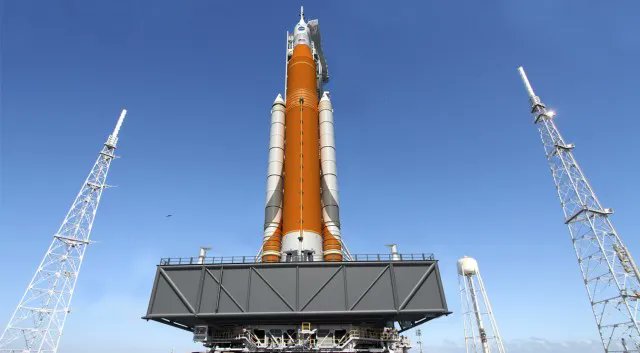This will likely come as a surprise to no one who has closely watched the development of NASA’s next giant rocket, the Space Launch System (SLS), but it’s going to be expensive to use. Like, really expensive – to the tune of $4.1 billion per launch, according to the NASA Inspector General. That’s over double the original expected launch cost.
It is also an absurd amount of money, coming in at a whopping $58,000 per kilogram launched to low Earth orbit if the expected payload weights are to be believed. Granted, SLS would potentially be the biggest launch system ever created when (or if) it leaves the ground. Therefore, it would have the unique ability to launch single payloads that had never been possible before. So, where did it all go so wrong?
SLS’s development started in 2011 after NASA retired the Space Shuttle. Lacking a system to put its own astronauts into orbit, NASA reached out to its commercial partners to help facilitate its design and construction. Budgeted initially with $7 billion, the project cost has ballooned to over $23 billion, with no end in sight. In fact, an additional delay right before the Congressional hearings pushed a critical test milestone back another two months to May. NASA administrators even preemptively cautioned that the updated date might be hard to hit.
Credit – House Science, Space, and Technology Committee YouTube Channel
Whenever an extensive, public federal program like this runs into trouble, there is bound to be finger-pointing. There certainly was at the House committee hearing where NASA Inspector General Paul Martin pointed his straight at the representatives on the committee. Congress, he said, had, in effect, bound NASA’s hands by requiring the agency to engage in “cost-plus” contracts with suppliers.
These contracts mean that any firm working on the project would be reimbursed for their expenses and rewarded with a fee over and above those expenses. The obvious problem with such contracts, as has been painfully obvious with SLS contractors Lockheed Martin and Boeing, is that they incentivize the contractors to incur more expenses to do the same amount of work, thereby increasing the fee they receive.
Boeing, the struggling aerospace giant that has faced a series of public relations disasters in recent years, came in for particular criticism from Martin. He lambasted their technical and project management skills and noted they were still paid a handsome bonus for their incompetence.

Credit: NASA/Cory Huston
As with all such contractual mandates handed down to a Federal agency, politics certainly had something to do with it. The SLS system has provided plenty of jobs in some critical districts for certain influential members of Congress, and if the project happens to run a bit over budget to support those jobs, so be it. But to anyone who doesn’t directly benefit from the largesse sloshing around these rocketry contracts, it simply looks like the government is spending billions of dollars on a rocket that is already obsolete before it ever even leaves the ground.
That is because the SLS has a huge weakness that hikes its single launch cost up into the billions – it is expendable. After launch, the main stage is lost to the ocean, never to be recovered. That is a stark contrast to another well-known launch system that happens to be run by a much more agile firm without a cost-plus contract. Starship has a potential payload capacity almost 30% larger than SLS’s – and it’s reusable, potentially bringing the cost per kilogram launched down to $10.
If SpaceX reaches its admittedly ambitious launch cost goal, there is no feasible way for SLS to compete with it. NASA seems to have already realized this, selecting the Falcon Heavy for the Europa Clipper mission (due to part to technical difficulties of the SLS), and even enlisting Starship to help land the first Artemis missions on the Moon.
Ultimately, in a capitalist society, the resources go to the most effective and efficient use, as long as the government does not contractually mandate those uses. In the case of the SLS, the government seems to have saddled its space agency with the development of a massively over-budget launch system that might already be obsolete by the time it enters service. That won’t change no matter how many Congressional hearings are held about it.
Learn More:
ExtremeTech – NASA Auditor Reveals ‘Unsustainable’ Cost for SLS Launches
Ars Technica – Finally, we know production costs for SLS and Orion, and they’re wild
House Subcommittee on Space and Aeronautics – KEEPING OUR SIGHTS ON MARS PART 3: A STATUS UPDATE AND REVIEW OF NASA’S ARTEMIS INITIATIVE
Lead Image:
SLS lining up for launch.
Credit – NASA


Maybe this is just ONE of the reasons why we don’t see any spacefaring civilizations. They realized it was too expensive.
Considering that Space X may be capable of launching an 80 Kilo human to orbit for as little as $800 (per the above article), this seems to counter your theory and show that cost is not a problem.
Did you read to the end of the article?
It *does not* have to be *that* expensive. Falcon Heavy — which exists *right now* — can lift 70% of what the SLS can do, at less than 1/10 the cost … well, with these recent figures, *much less* than 1/10th.
When/if Starship works, SLS is an absolute absurdity.
You don’t come up with a mission in order to justify the huge money you’re funneling to vendors. You come up with a worthwhile mission and spend only as much money as you must in order to accomplish it, based on *engineering* considerations. Spending taxpayer’s money is not the *mission* — or at least it shouldn’t be, if you actually want to accomplish things worth accomplishing.
Cost-plus contracting must be abolished. It’s ridiculous. It’s a scam.